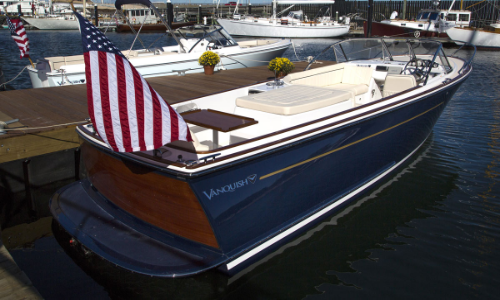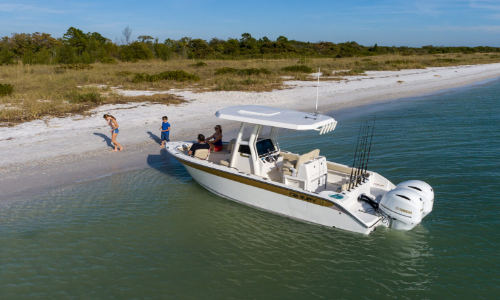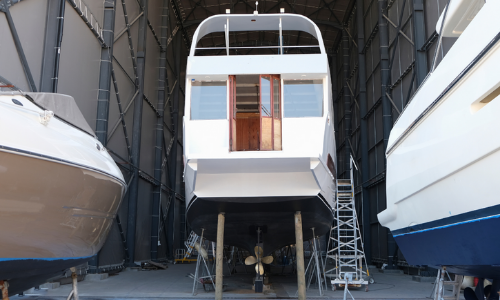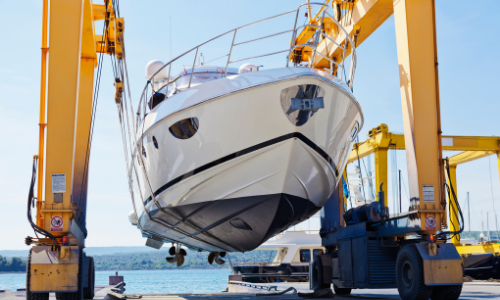
Boat & Yacht Etiquette
January 19, 2022
Understanding Boat Insurance
February 8, 2022Walkthrough of the Boat Buying Process
Purchasing a boat is all about finding the right watercraft to suit your lifestyle needs.
If you’ve ever financed a new car or bought a house, the process of buying a yacht might seem familiar. However, there are some notable differences that new boat buyers and seasoned yachtsmen should keep in mind to make the process easier.
In This Article:
This guide highlights what to expect when buying a yacht, thoughtful questions you should ask, and how buying a used boat differs from purchasing a brand new vessel.
Use this information to help you prepare for your next purchase.
Looking to buy a pre-owned model? Let our checklist for buying a used boat steer you in the right direction.
- What to expect in the boat-buying process including sales contracts, escrow, down payments, financing options, and insurance.
- Questions to ask when buying a new boat.
- Questions to ask when buying a used boat.
- The differences between buying used vs. new, including information on brokers, aftermarket warranties, inspections and acceptance policies.
- A used boat checklist to guide you through the process.
What to Expect
How Do You Plan to Use It?
Defining your mission statement, or how you plan to use your watercraft, is the first step in the boat-buying process.
"People buy these types of products because they have a vision for what they want their leisure time to be,” says William Morong, CEO of Yachting Solutions. “This is a vehicle to help them get there.”
First Hand Research
First-time boat buyers tend to have preconceived notions about the boat they think they want and how they will use it. Before settling on a specific brand, model, size, or type of yacht, try to attend a few boat shows, view dealer demos, or go on a day charter to learn about the different boats available.
What Does Your Lifestyle Require?
You should also consider important factors like:
- Activities: The types of activities you enjoy, such as watersports, coastal cruising, or off-shore fishing.
- Size of Your Group: How many passengers you plan to have on board, including you, your family, and any guests.
- Space You Need: Which size range and boat length offers the space you need.
- Amenities:What amenities will make trips more comfortable and enjoyable for you and your family.
- Seasonality: What times of the year you plan to use the boat, and how long your voyages will last.
- Storage: Boat storage options, including boatyard or marina storage, plus indoor vs. outdoor storage.
- Transport: How you plan to transport the boat, whether via trailer or a certified marine transportation company.
Value of a Good Broker
Once you’ve fully defined your mission statement, talk to a dealer or broker. Sometimes, the boat you're envisioning isn't the one you need to achieve your yachting goals. Whether you’re buying used or new, brokers and dealers can guide you through the process of purchasing a luxury boat that you, your family, and your friends can all enjoy.
It's important to remember that buying your first yacht is the best way to learn if a particular vessel is right for you.
“When buying your first boat, you’re probably not buying your last. Be thoughtful about how you are going to use the boat but, at the same time, [you should] buy a boat, use it and see what you like and what you don’t like.”
Contracts & Escrow
What's in a Contract?
Sales contracts are legally binding, written agreements that outline all boat buying terms to protect the buyer's interest. Contracts spell out the buyer and seller’s obligations, a description of the boat, purchase price, deposits, boat condition, warranty, and the time frame of the sale.
Contingencies
You should also include certain contingencies in your contract to ensure that the sale hinges on buyer satisfaction.
Good Faith Deposits
Another important part of this purchase agreement is a good faith deposit. Boat buyers make this payment into an escrow account to show their commitment to purchasing their chosen watercraft. Good faith deposits protect the seller from having to pay more upon default of the sale and protect the buyer by ensuring that the boat cannot be sold to a higher bidder once their offer is accepted.
Deposits for Used Boats
For used boat sales, you’ll give your broker 10% of the purchase price, which then goes into their escrow account. If the boat you want to buy is in storage, you can agree to an escrow holdback that will pay for any repair needs that you discover upon inspection once the boat is available. Be sure to specify the issues and maintenance costs you're willing to cover in your sales contract.
Down Payment
Whether you’re buying a used boat or a new boat, most lenders require a down payment between 10 and 20%, depending on the selling price of the boat. Make sure you have this down payment ready at closing. As with any loan, the higher down payment you make, the lower your monthly rate is likely to be.
Financing Options
Even if you have the cash to buy your boat now, financing has many benefits. You might be able to set sail in a more expensive dreamboat if you finance the vessel rather than buying it outright. Before purchasing a yacht, calculate the total price of the boat, maintenance, repairs, storage, insurance, and fuel. Financing can give you money to fall back on when covering these additional costs.
Lenders
Financing a yacht is like getting a loan on a new car or signing up for a mortgage. Once you determine the yacht you want to buy and have the purchase price, you can choose a lender. Lenders consider your credit score, debt to income ratio, job stability, and net worth to determine whether you qualify for a loan.
Someone looking to finance a used or new boat can try:
Financing Options
Dealers & Loans
Dealers have plenty of experience setting up boat loans and can offer guidance to make the process of buying your new boat as easy as possible. However, if buying a used boat, you might want to get a personal loan from your bank for potential tax benefits and a lower interest rate. Meanwhile, a marine lender could help you arrange a lower down payment or create a monthly payment plan.
Getting Boat Insurance
Insuring your boat protects your investment and offsets the risk of operating a boat to protect you and your loved ones in the event of a boating accident. Many banks and marinas place insurance requirements on both buying a boat and storing it. To verify the boat insurance requirements in your state, contact the state marine board. Your insurance policy may include:
What to Look for When Buying a Boat
According to Morong, “Buyers don’t always understand what’s involved in the process of the transaction.” This lack of understanding can result in some missteps and unwelcome surprises during the process of buying a boat.
Questions to Ask When Buying a New Boat
Asking your dealer or broker the right questions can help you understand how to buy a boat and avoid making common mistakes.
There’s a wide variety of new boats on the market, some more complex than others. And while impulse buys can sometimes lead you to the vessel of your dreams, you should still consider asking questions about a new boat before you buy it.
The following list contains questions you should ask and what you need to know before buying a boat:
What to Ask About
Differences in Buying Used vs New
“I find that new boat and used boat buyers are generally predetermined,” says Morong.
Some buyers want everything brand new, while others prefer paying a lower price for a used craft, vowing to fix it up, and never buying new again. In most cases, the decision between new vs. used depends on each boater's experience with the boat buying process.
According to Chace, first-time boat buyers should lean toward buying something as new as possible.
“You want to make your boating experience more enjoyable and as stress-free as possible,” he says.
A new boat is less likely to have the issues that often come with a pre-owned model. Also, buying a new boat ensures that the craft gets proper care and maintenance from the beginning.
Less Stress on the Water
With new boats, there are usually no negative surprises. You don’t have immediate maintenance costs, newer designs are more efficient, and you can upgrade them to suit your unique style. On the other hand, used boats in good condition are lower-priced and offer a larger selection to choose from. Depending on what you're looking for, one may be a better option than the other.
Questions to Ask When Buying a Used Boat
Buying a pre-owned boat often involves more legwork than purchasing a brand new yacht. Make sure you’re working with a seller or broker who understands your needs and won't try to overcharge you or pressure you into choosing a new model that's outside of your price range.
When buying used, some questions you might want to ask include:
Using A Broker
When buying a used boat, it's a good idea to go through a broker. Brokers are sales consultants that work like real estate agents; only they’re more involved in making sure you buy the best boat for your lifestyle.
“What really makes the difference is finding a broker that you relate to and feel is knowledgeable enough to represent your interests,” says Morong.
Brokers work on commission, typically charging 10% of the sale price. To find your ideal yacht, a good broker will ask questions about what type of boating you enjoy and where you like to travel. They also negotiate prices and contracts and handle the sales process until closing. Find a Certified Professional Yacht Broker (CPYB) online or ask for recommendations around a marina or boatyard.
Warranty Extensions on Used Boats
“New boats are brand new with a full factory warranty. You can feel comfortable buying the boat at its sales price. In a used transaction, it’s buyer beware,” says Morong.
Some warranties are only transferable to the second owner, who receives the remaining time on the original coverage plan. Unlike a car, only individual parts of the boat are under manufacturer warranty, not the entire vessel.
Aftermarket
While the lifetime hull and deck warranties from most manufacturers are promising, these aren’t what typically fail, according to Morong. Plus, manufacturer warranties leave the boat owner with certain costs not covered under the contract. Therefore, you may want to consider aftermarket warranties when buying a used boat.
Extended warranties are available through third-party administrators that you can find through your broker or dealership. Aftermarket warranties are service contracts that provide peace of mind while cruising the coast, traveling long distances, or storing your yacht. Generally, they cover both the repair costs and the labor.
Surveyors and Inspections
Professional inspections are crucial when buying a home, and buying a used boat requires the same due diligence. Your broker usually provides a list of professional, certified boat surveyors that they've worked with before. However, it's up to you to compare rates for each surveyor and schedule an inspection.
Value of Surveyor
A surveyor checks for issues with a vessel's water intrusion, electrical or plumbing, mechanical, and other related systems. Having the boat inspected protects buyers from discovering issues post-purchase that were undisclosed in the sales contract.
“It’s your job as the buyer to find out what’s wrong with that boat,” says Chace, “so you need to hire people to do that.”
When buying a used boat, you want to make the sales contract subject to a(n):
- Appraisal
- Mechanical Inspection
- Engine Oil Samples
- General Survey and Visual Inspection
- Sea Trial
It's important that the surveyor inspects the boat for specific damages as well as considering its overall condition. Some surveyors may lack the necessary certifications to inspect a particular engine or mechanical system, so you should consult the International Association of Marine Surveyors or the Society of Accredited Marine Surveyors to find a professional with the skills you need.
Policies of Acceptance
With a new boat, the choice is simple: will you buy the boat or not? However, with used boats, there are two different kinds of acceptance in the brokerage world. After you receive the results of inspections and take the boat for a sea trial, you can decide whether to accept the boat as-is or under certain conditions.
Acceptance As-Is
If you choose to accept the boat as is, it usually means that the inspection results were free of any major issues or repair needs. As such, you agree that you will not ask the seller to make any additional repairs or negotiate a new price.
Conditional Acceptance
Those who are unhappy with the survey results may choose to accept the boat under the condition that the seller makes specific repairs or reduce the price to compensate for the issues found during the inspection. If you choose this option, you will have to renegotiate the terms of sale.
A potential buyer might decide not to buy a used boat if they cannot get the financing, feel uncomfortable about the survey results, or didn’t like how the boat felt during the sea trial. If you do not buy the boat, you'll receive a refund of your escrow money. However, you'll still need to cover the cost for the inspections, launching the boat for the trial, and docking it afterward.
Buying A Boat Checklist
Before buying a new boat, you'll want to be sure that it has all the amenities and features you're looking for. Make a list of everything you want, and let the dealer guide you through purchasing your new vessel. If you're in the market for a pre-owned craft, use this helpful checklist for buying a used boat to ensure that the process goes as smoothly as possible.
Work with a Broker
Find a Used Boat for Sale
Make an Offer and Deposit
Sea Trial
Survey & Inspection
Accept or Reject
Storage & Transportation
Insurance
Closing
Buying A Yacht or Boat You Love
Buying a boat is a lengthy ordeal and a huge financial commitment. However, it's also an investment toward fun family vacations, coastal cruises with friends, or relaxing solo fishing trips. While the process can seem arduous, many first-time boat buyers find that it's all been worth it once they “get out there and get on the water,” according to Chace.
Whether you're a first-time buyer or a returning customer, buying a boat is about following your vision and learning through trial and error what it takes to achieve it. Taking the boat buying process step-by-step with the right dealer or broker can help you find a yacht you love that will last you throughout all your waterborne journeys.




